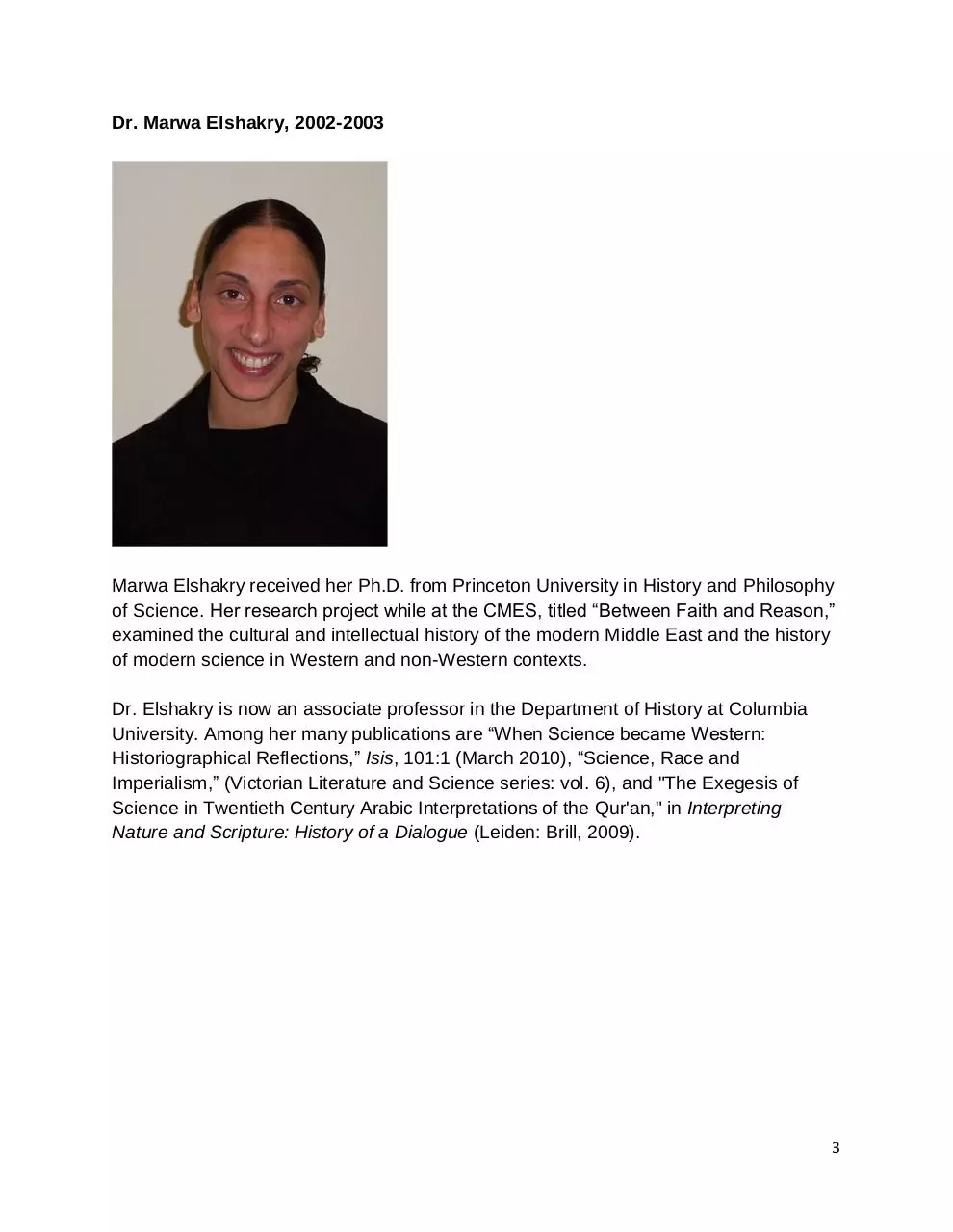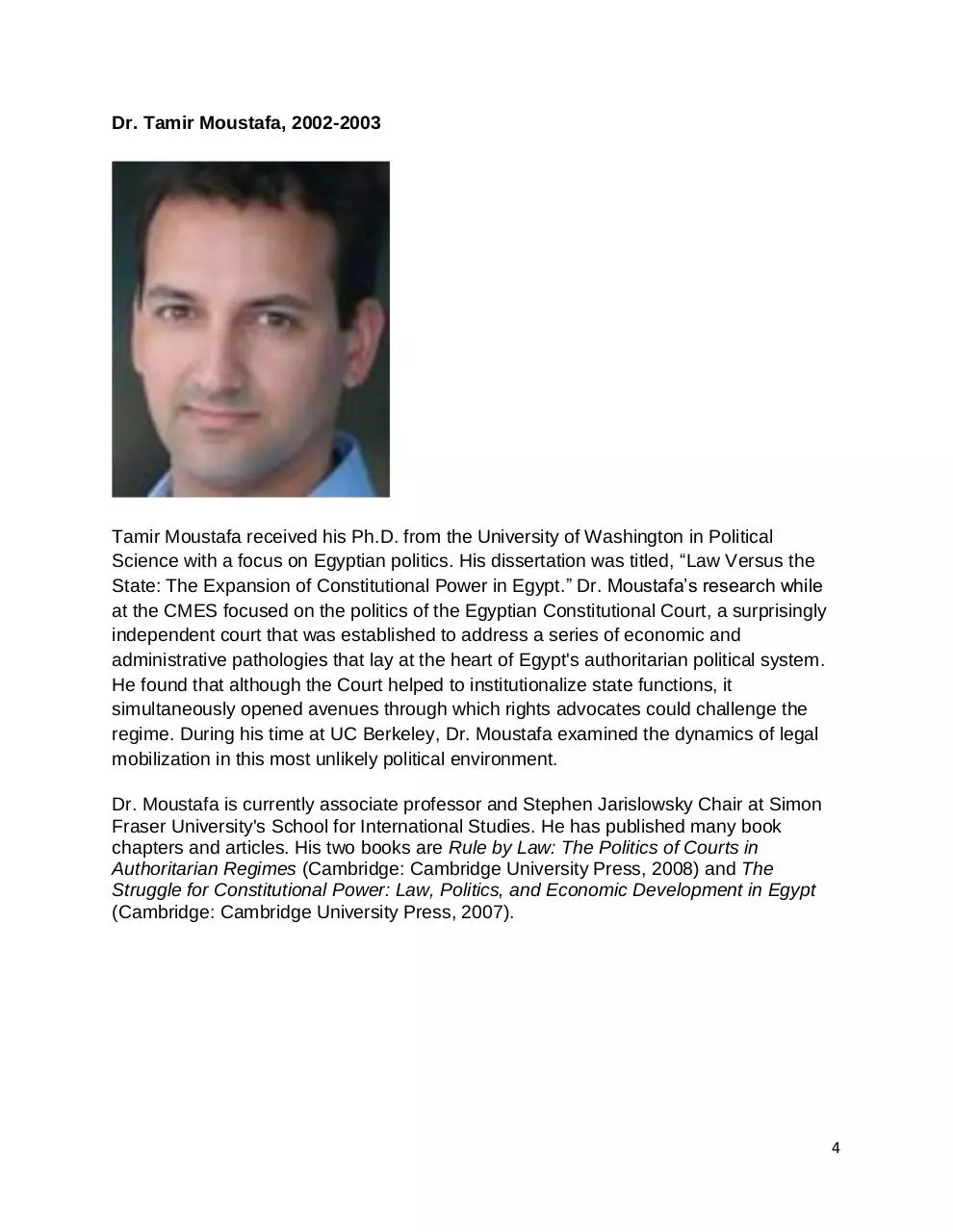Sultan Program w photos Nov 28 2 (PDF)
File information
Title: The Sultan Program in Arab Studies
Author: Tomi Laine Clark
This PDF 1.5 document has been generated by Microsoft® Word 2010, and has been sent on pdf-archive.com on 01/12/2014 at 23:19, from IP address 128.32.x.x.
The current document download page has been viewed 3324 times.
File size: 570.31 KB (17 pages).
Privacy: public file





File preview
The Sultan Program in Arab Studies
at the Center for Middle Eastern Studies (CMES), University of California, Berkeley
The First Decade
The Sultan Program in Arab Studies Program was established in 1999 through a
generous endowment from the Sultan bin Abdul Aziz Al-Saud Charity Foundation. It
supports teaching, research, and public outreach on topics related to the Arab and
Arab-Islamic world, with the overarching goal of promoting a deeper understanding of
the Middle East on the UC Berkeley campus and beyond. The program’s themes
encompass the social sciences, humanities, and professional fields, with special
emphasis on integrating insights into the Arab world from the following disciplines:
anthropology, architecture, history, literature, political science, sociology, and urban
studies.
The endowment supports graduate and undergraduate fellowships as well as research
and programming grants for faculty. Its centerpiece, however, is the post-doctoral
fellowship. Each year, the CMES holds an international competition to identify a Sultan
Post-Doctoral Fellow. The successful applicant comes to UC Berkeley for a semester or
a year to engage in research and participate in the monthly meetings of the Sultan
Working Group and in wider campus activities. His/her presence on campus results in a
mutually-beneficial intellectual synergy. Partly as a result of their UC Berkeley
experiences, many Sultan Post-Doctoral Scholars have gone on to hold major positions
in the academic world and publish some of the field’s most important works.
The CMES is proud to recognize more than a decade of outstanding scholarship in Arab
Studies through the Sultan Program.
1
Sultan Post-Doctoral Fellows, 2001-2012
Dr. Mandana Limbert, 2001-2001
Mandana Limbert received her Ph.D. in Anthropology and Near Eastern Studies from
the University of Michigan in 2002. Her research while at the CMES concerned Arab
Identity in Oman.
Dr. Limbert is now an associate professor of Anthropology at The Graduate Center and
Queens College of the City University of New York. In addition to numerous articles, Dr.
Limbert co-edited Timely Assets: The Politics of Resources and their Temporalities
(Sante Fe: School for Advanced Research Press, 2008). Her book, In the Time of Oil:
Piety, Memory, and Social Life in an Omani Town (Palo Alto: Stanford University Press,
2010), examines shifting notions and practices of sociality and religion in a dramatically
transformed petro-state. With support from the American Council of Learned Societies
and fellowships from the City University of New York, Dr. Limbert has begun writing her
next book, Oman, Zanzibar, and the Politics of Becoming Arab, which deals with
changing notions of Arabness in Oman and Zanzibar over the course of the twentieth
century.
2
Dr. Marwa Elshakry, 2002-2003
Marwa Elshakry received her Ph.D. from Princeton University in History and Philosophy
of Science. Her research project while at the CMES, titled “Between Faith and Reason,”
examined the cultural and intellectual history of the modern Middle East and the history
of modern science in Western and non-Western contexts.
Dr. Elshakry is now an associate professor in the Department of History at Columbia
University. Among her many publications are “When Science became Western:
Historiographical Reflections,” Isis, 101:1 (March 2010), “Science, Race and
Imperialism,” (Victorian Literature and Science series: vol. 6), and "The Exegesis of
Science in Twentieth Century Arabic Interpretations of the Qur'an," in Interpreting
Nature and Scripture: History of a Dialogue (Leiden: Brill, 2009).
3
Dr. Tamir Moustafa, 2002-2003
Tamir Moustafa received his Ph.D. from the University of Washington in Political
Science with a focus on Egyptian politics. His dissertation was titled, “Law Versus the
State: The Expansion of Constitutional Power in Egypt.” Dr. Moustafa’s research while
at the CMES focused on the politics of the Egyptian Constitutional Court, a surprisingly
independent court that was established to address a series of economic and
administrative pathologies that lay at the heart of Egypt's authoritarian political system.
He found that although the Court helped to institutionalize state functions, it
simultaneously opened avenues through which rights advocates could challenge the
regime. During his time at UC Berkeley, Dr. Moustafa examined the dynamics of legal
mobilization in this most unlikely political environment.
Dr. Moustafa is currently associate professor and Stephen Jarislowsky Chair at Simon
Fraser University's School for International Studies. He has published many book
chapters and articles. His two books are Rule by Law: The Politics of Courts in
Authoritarian Regimes (Cambridge: Cambridge University Press, 2008) and The
Struggle for Constitutional Power: Law, Politics, and Economic Development in Egypt
(Cambridge: Cambridge University Press, 2007).
4
Dr. Jessica Winegar, 2002-2003
Jessica Winegar received her Ph.D. in Anthropology from New York University. Her
dissertation was titled, “Claiming Egypt: The Cultural Politics of Artistic Practice in a
Postcolonial Society.” Dr. Winegar’s CMES-sponsored research took a critical look at
Egyptian artists’ conflicting and competing understandings of nationalism and western
influence. In that work and in her new projects, she is primarily concerned with the
multiple ways that culture projects create social hierarchies and modern subjects while
frequently hiding the mechanisms of these processes, thereby contributing to their
durability. Her first book, Creative Reckonings: The Politics of Art and Culture in
Contemporary Egypt (Palo Alto: Stanford University Press, 2006), focused on these
processes in the realm of the visual arts and was based on the dissertation she revised
as a Post-Doctoral Fellow at the CMES.
Dr. Winegar is now an associate professor at Northwestern University in the
Department of Anthropology and is currently working on two new books. The first,
tentatively titled Culturing Youth: Democracy, Creativity, and Development in the Middle
East, charts the meteoric rise, successes, and challenges of state and NGO cultural
development programs directed toward poor and working class youth in Egypt. Dr.
Winegar is also writing, with Lara Deeb, a book entitled Anthropology’s Politics:
Discipline and Region through the Lens of the Middle East (under contract with Stanford
University Press). This book examines how social life in the post-Cold War Middle East,
as well as developments in academic thought and the structure of the American
academy, have challenged traditional culturalist anthropological approaches at the
5
same time that “culture” has become a key device to explain the Middle East outside of
academia, particularly in government projects.
6
Dr. Persis Berlekamp, 2003-2004
Persis Berlekamp earned her Ph.D. from the Department of History of Art and
Architecture, with an Islamic Concentration, from Harvard University. While a Sultan
Post-Doctoral scholar, she pursued research concerning the transformation of the Arab
scientific painting tradition in the wake of the Mongol conquest. Her more recent
research has focused on the art of the book in Arab and Persian cultures, Neoplatonic
cosmography and the imaging of natural history, alchemy and astrology; and the
application of medieval Islamic traditions of medical illustration to Chinese medicine. In
her ongoing explorations of the relationship between art history and intellectual history
in late medieval Islamic art, she is researching Seljuk sculpture, and how theoretical
understandings of talismans relate to their visual forms.
Dr. Berlekamp is now an associate professor of Art History and Islamic Art at The
University of Chicago, where she teaches courses on a wide range of topics in the
history of Islamic art and architecture. Her many publications include Wonder, Image,
and Cosmos in Medieval Islam (New Haven: Yale University Press, 2011), “The Limits
of Artistic Exchange in Fourteenth-Century Tabriz: The Paradox of Rashid Al-Din’s Book
on Chinese Medicine, Part I,” in Muqarnas (2010), and “From Iraq to Fars: Tracking
Cultural Transformations in the 1322 Qazwini cAja’ib Manuscript,” in Arab Painting: Text
and Image in Illustrated Arabic Manuscripts (Leiden: Brill, 2007).
7
Dr. Rochelle Davis, 2003-2004
Rochelle Davis received Ph.D.s in Arabic Literature and in Anthropology, both from the
University of Michigan. Her project while a Sultan Post-Doctoral Fellow at the CMES
was titled, “History and Memory: Palestinian Recollections of Life Before 1948.” It
explored how we narrate the past in an effort to understand history. Her CMES PostDoctoral Fellowship was the first step in her work on Palestinian village memorial books,
which resulted in the publication of her book Palestinian Village Histories: Geographies
of the Displaced, (Palo Alto: Stanford University Press, 2011). This book was co-winner
of the Middle East Studies Association’s Albert Hourani Book Award to recognize
outstanding publishing in Middle East studies. Her other publications include
“Language and Loss, Or How to Bark like a Dog and Other Lessons from al-Jahriz,”
Critique Spring (2004) and “Commemorating Education: Recollections of the Arab
College in Jerusalem, 1918-1948,” in Comparative Studies of South Asia, Africa and the
Middle East 23.1 & 2 (2003).
Dr. Davis is currently an associate professor of Arab Studies at the Center for
Contemporary Arab Studies in the Edmund A. Walsh School of Foreign Service,
Georgetown University. Dr. Davis’ current research focuses on the role of culture in the
U.S. military in the wars in Iraq and Afghanistan.
8
Dr. John Tofik Karam, 2004-2005
John Tofik Karam received his Ph.D. in Anthropology from Syracuse University. While
a Sultan Post-Doctoral Fellow at UC Berkeley, Dr. Karam completed the manuscript,
“Ethnic Entitlement: The Arab Project in Neoliberal Brazil.” Based on his dissertation,
this work inquires into how Arabness has attained a marked presence in Brazil today.
Dr. Karam is now an associate professor in the Latin American and Latino Studies
Program at DePaul University in Chicago. Based in Historical Anthropology, he studies
Arab ethnic and diasporic formations in the twentieth and twenty-first centuries, and
more crucially, their bearing upon the current reordering of Brazil and the Americas.
Revealing how Arabness helped to define Brazil’s transition from state-led to free
market economics, his first book, Another Arabesque: Syrian-Lebanese Ethnicity in
Neoliberal Brazil (Philadelphia: Temple University Press, 2007), won awards from the
Arab American National Museum and the Brazilian Studies Association. Dr. Karam is
now working on his second book, Redrawing the Americas: The Arab Diaspora at the
Tri-Border and the Rise of Brazil. Focusing on the fifty-year history of Muslim
Lebanese and Palestinians at a South American trinational border, this work maps the
role of their diaspora in Brazil’s contested emergence as a regional power in relation
to Argentina, Paraguay, and U.S.-South American geopolitics.
9
Download Sultan Program w photos Nov 28-2
Sultan Program w photos Nov 28-2.pdf (PDF, 570.31 KB)
Download PDF
Share this file on social networks
Link to this page
Permanent link
Use the permanent link to the download page to share your document on Facebook, Twitter, LinkedIn, or directly with a contact by e-Mail, Messenger, Whatsapp, Line..
Short link
Use the short link to share your document on Twitter or by text message (SMS)
HTML Code
Copy the following HTML code to share your document on a Website or Blog
QR Code to this page

This file has been shared publicly by a user of PDF Archive.
Document ID: 0000196928.